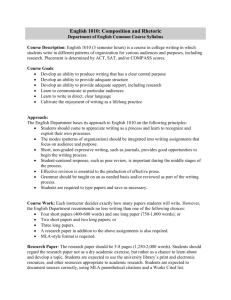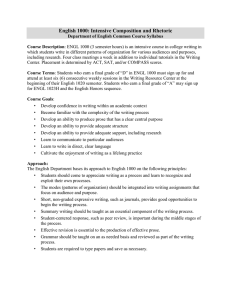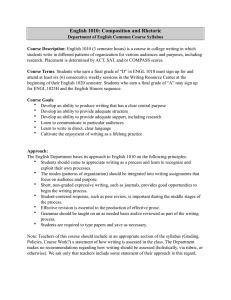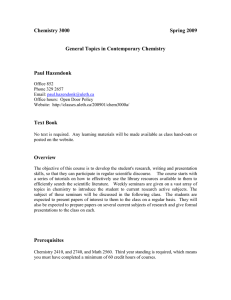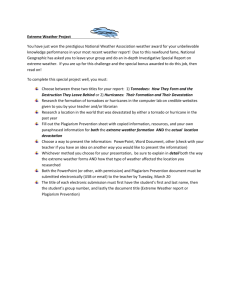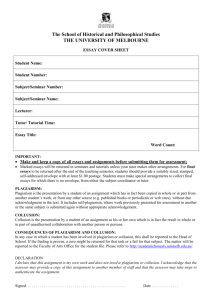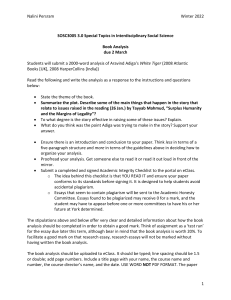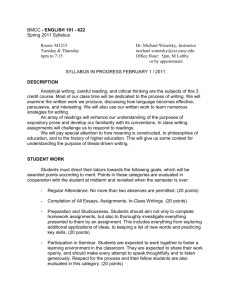Research Tips Slideshow
advertisement
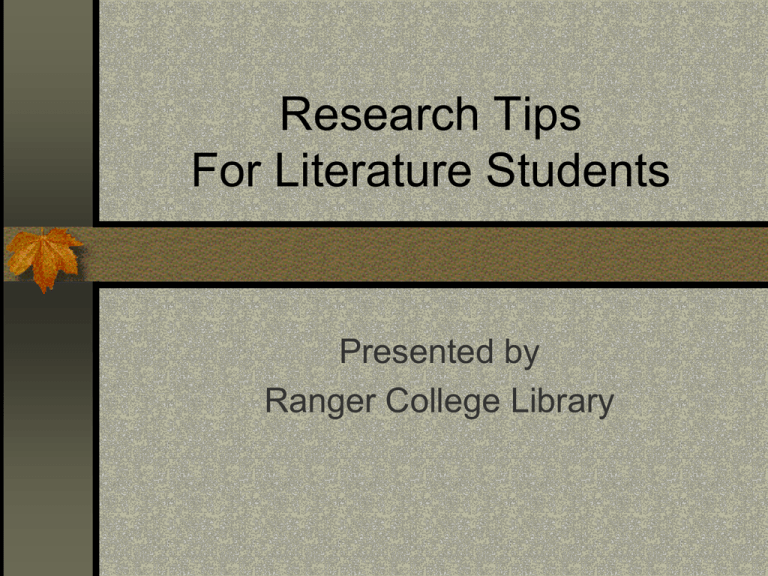
Research Tips For Literature Students Presented by Ranger College Library Purpose This presentation is designed to support you as you use electronic and print resources to: Identify sources of critical essays Cite sources for a research paper Definitions Research "The purpose of research is not simply to retrieve data, but to participate in a conversation about it (Brent 109).” Research is a social activity intended to create: NEW Knowledge! What is Plagiarism? http://www.gale.cengage.com/free_resources/term_paper/index.htm Because your purpose is to create new knowledge while recognizing those scholars whose existing work has helped you in this pursuit, you are honor bound never to commit the following academic sins: 1) Plagiarism: Literally "kidnapping," involving the use of someone else's words as if they were your own (Gibaldi 6). To avoid plagiarism you must document direct quotations, paraphrases, and original ideas not your own. 2) Recycling: Rehashing material you already know thoroughly or, without your professor's permission, submitting a paper that you have completed for another course. Don’t turn in a paper you have already done! Is it plagiarism? Take this short quiz to find out! http://library.acadiau.ca/tutorials/plagiarism/ Beginning Research Online vs. Print Book vs Computer (from Sydney Morning Herald) adamstownsp.catholic.edu.au Finding Critical Essays Print sources in the library Reference section • CLC – Contemporary Lit. Criticism • TCLC- 20th Century Lit. Criticism • Novels for Students • Look for call number PN771 • (Library of Congress) Books to borrow Circulating Non-Fiction Where is this located? 813, 814 in Dewey Decimal System “P” Library of Congress Finding critical essays online To use Texshare databases: www.rangercollege.edu/library Search Databases On campus, You will automatically be logged on. Off campus, The user ID is: rcc5162 Password: tx76470 Library web page Click here! Online Article from Gale (Literature Resource Center) Literature Resource Center Will be near lower right corner Literature Resource Center Basic search type in title of work Click “name of work,” search Tutorials for more help Tutorials are on the library’s web page! Other online sources There are many Web pages devoted to individual authors. Some are unofficial fan sites and as such may not be appropriate resources for a scholarly paper, but they may contain ideas for topics and provide interesting information about your author. Credibility of online sources I. Authority Is there an author? Is the page signed? Is the author qualified? An expert? If the page includes neither a signature nor indicates a sponsor, is there any other way to determine its origin? Look for a header or footer showing affiliation. Look at the URL. http://www.fbi.gov Look at the domain. .edu, .com, .org, .net Authority Anyone can publish anything on the web. It is often hard to determine a web page's authorship. Even if a page is signed, qualifications are not usually provided. Accuracy II. Accuracy Is the information reliable and error-free? Is there an editor or someone who verifies/checks the information? Remember… Unlike traditional print resources, web resources rarely have editors or fact-checkers. Currently, no web standards exist to ensure accuracy. Objectivity III. Objectivity Does the information show a minimum of bias? Is the page designed to sway opinion? Is there any advertising on the page? Rationale Frequently the goals of the sponsors/authors are not clearly stated. Often the Web serves as a virtual “soapbox.” Currency Is the page dated? If so, when was the last update? How current are the links? Have some expired or moved? Coverage What topics are covered? What does this page offer that is not found elsewhere? What is its intrinsic value? How in-depth is the material? Rationale Web coverage often differs from print coverage. Frequently, it's difficult to determine the extent of coverage of a topic from a web page. The page may or may not include links to other web pages or print references. Sometimes web information is "just for fun", a hoax, someone's personal expression that may be of interest to no one, or even outright silliness. http://lib.nmsu.edu/instruction/evalcrit.html Citation Help MLA Handbook (library reserve shelf & in Reference) Online Sources: Son of Citation Machine http://citationmachine.net/index2.php Also ---KnightCite http://www.calvin.edu/library/knightcite/index. php On the library web page! For more help…


